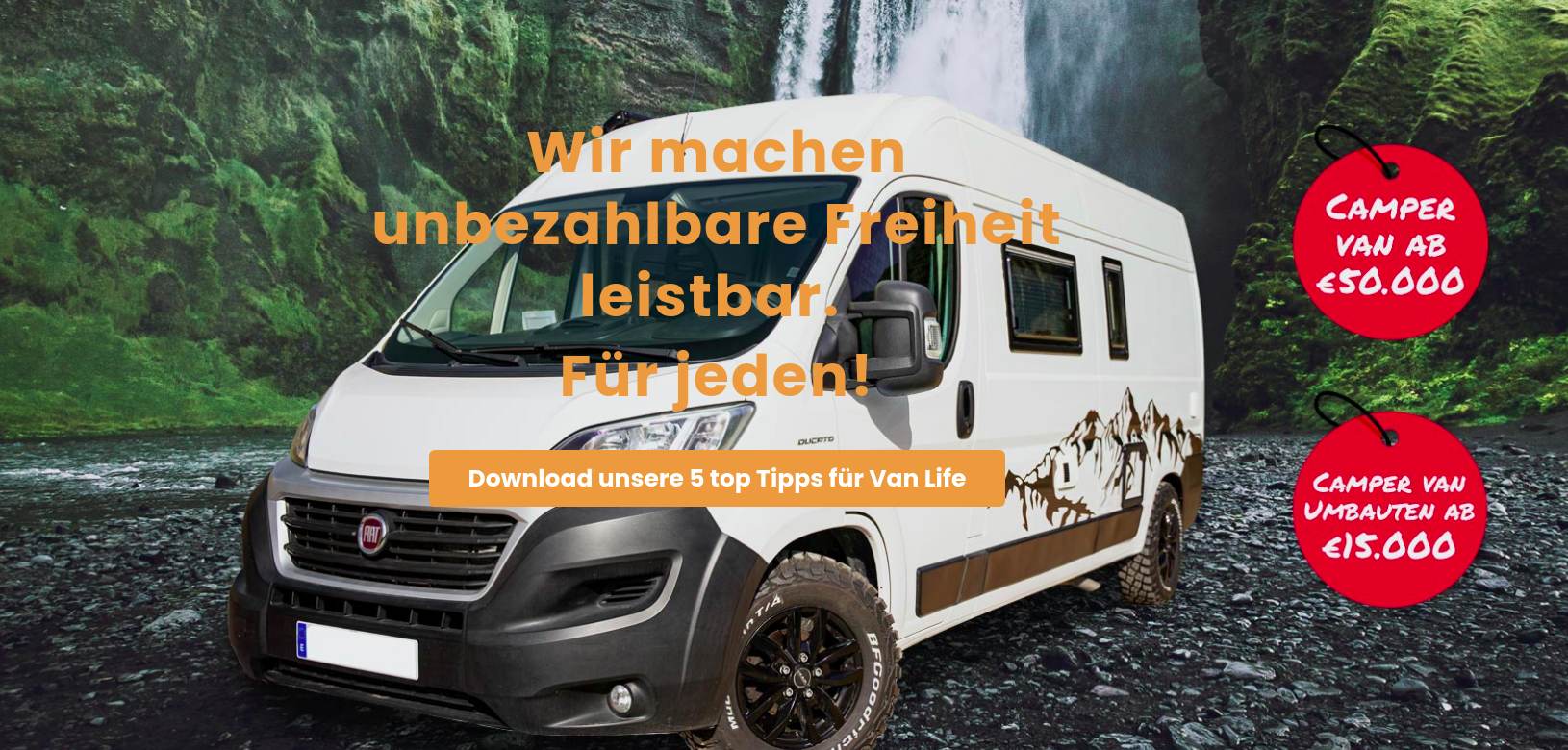Everything You Need to Know to Build Your Perfect Camper Van
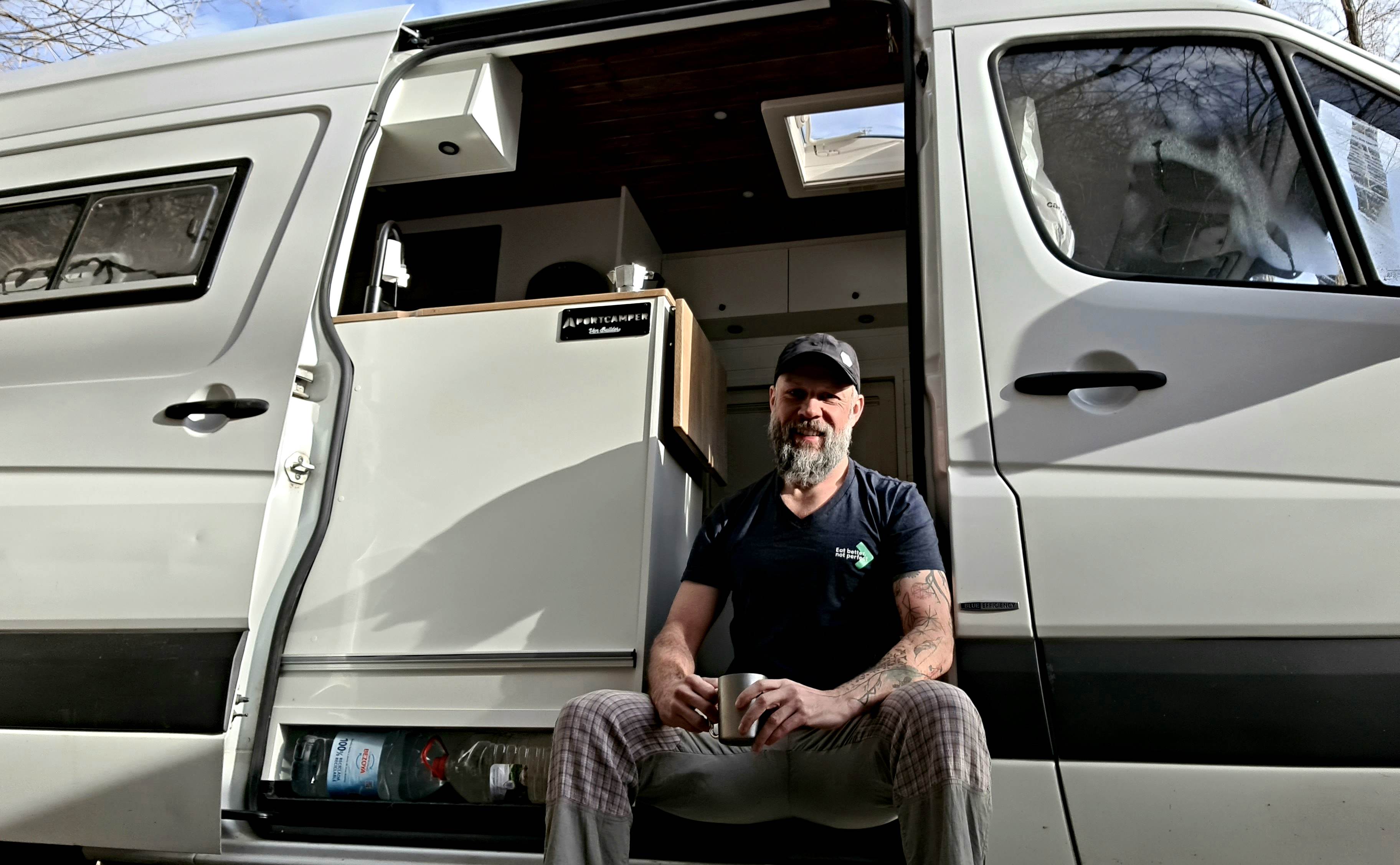
Thank you for subscribing!
Have a great day!
Living or traveling in a camper van means absolute freedom. Van life is booming. The pandemic contributed to that trend as people thirst for nature and spending time in the outdoors. I have been fascinated by that idea for many years. In December 2022, I completed my camper van project, which perfectly fits into my idea of lifestyle.
In this article, I will share with you everything you need to know to build your perfect camper van. I will summarise what a camper van is and what it means to jump into van life. I will go over the details about important decisions like your intended use, van size, model, interior design, and electrical and water systems. I will also proudly present my own creation, why I did it and how it contributes to my overarching purpose.
Wanna know more about vanlife? Check out my other article about How to Find the Absolute Freedom by Living in a Van.
What Is a Camper Van and What Is Van Life?
A camper van is the cool kid on the block. A camper van is not a motorhome or an RV. These are boring, ugly and for old people. A camper van typically is a converted van that comes in many shapes and forms. It is typically fully customised to the needs of its owner. And they also normally look awesome. Most camper vans if done right look like shiny, modern lofts on wheels. I will show you some examples later in this article. Motorhomes and RVs are typically bigger, more expensive, and dominated by some expensive, dinosaurian players on the market with little wiggle room.
Van life also comes in many shapes and forms. There is no rule, there is no one size fits all. And we find all extremes. Some people may spend the money to fully customise a van by a van builder to use it weekend-wise, while others may convert their van DIY and live in it full time. And we also find all combinations in between.
What all van lifers, however, have in common, is the love for nature, spending time outdoors, and adventure. We also love the flexibility of choosing the locations where we want to spend some time freely and based on our preferences. Typically van lifers also tend to minimalism as you can’t really bring a lot of things with you. Better learn to appreciate the simple things that life and nature gives you so plenty of. You should be well-organised and easy-going. Things may not always go to plan, stuff breaks, plans change and then you need to address this stoically.
With this quick level setting about camper vans and van life, let’s take a look at what things you should think about when building your own dream camper van.
A final note before we go into details:
This whole article is mainly about second hand camper vans. Of course, you can buy a top-notch polished camper van off-the-shelf from one of the car manufacturers directly. But these are crazy expensive and IMO it goes a bit against the idea of minimalist, resource-aware lifestyle that I am advocating.
Important Decisions for Building Your Perfect Camper Van
Getting yourself a camper van is an extremely exciting project that can literally change your life. The sense of freedom you get is incomparable. It will take a lot of your time (the more you think and plan the better) and money. But it will be yours and it should be perfect. So here are a couple of things to consider.
What’s Your Intended Use?
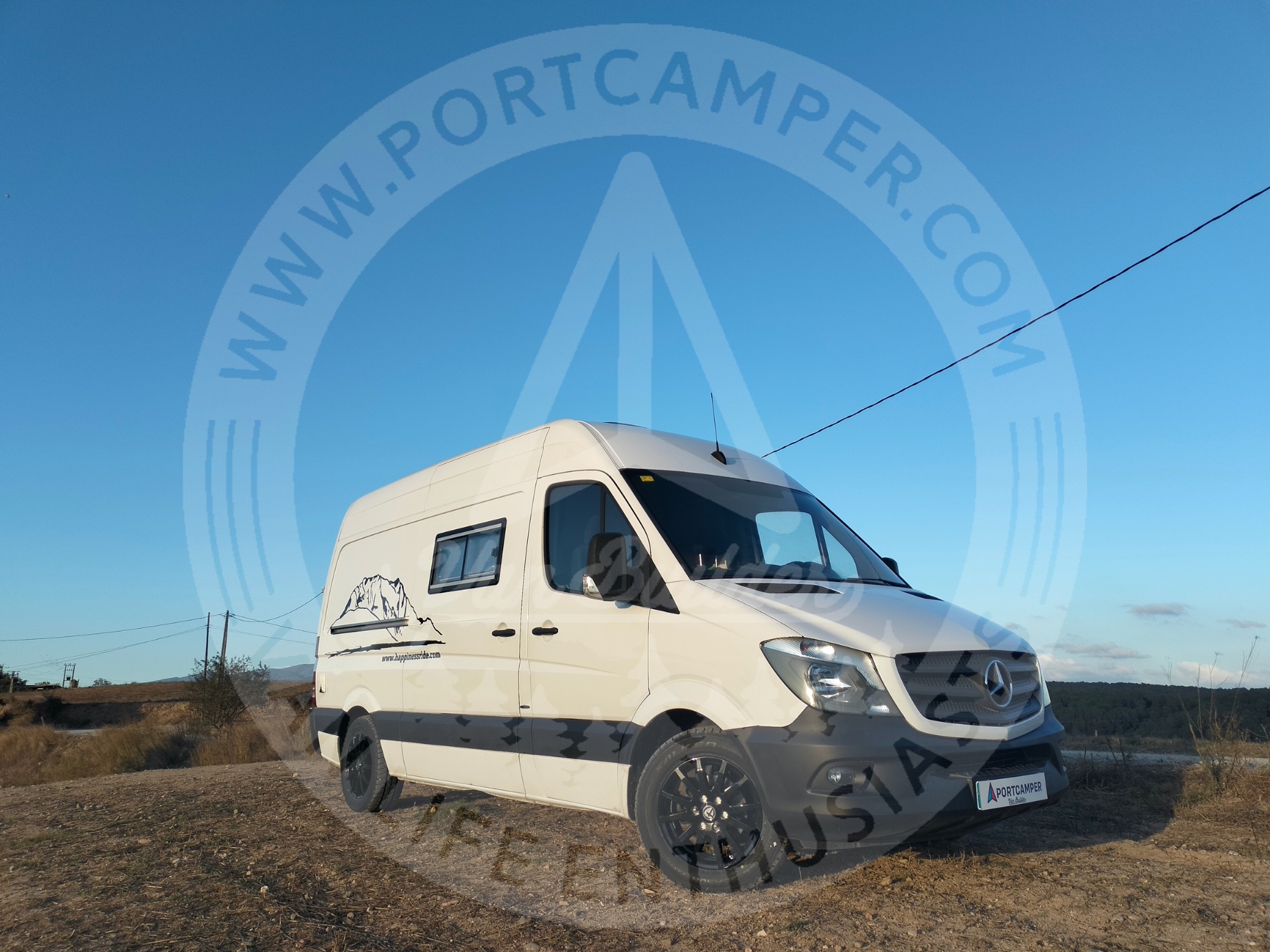
The first and probably most important decision is what you plan to use your camper van for. This influences everything else. There is a huge difference if you want a camper van to live in full time or if you only want to use it a couple of weekends per year. You also need to be clear about how many people you want to travel with. You need the right number of legalized seats (properly secured and with seat belts) and the right number of sleeping possibilities. This is difficult or very expensive to change later.
Size Matters
Related to the first question about the intended use is the size of the van. Of course preferences and looks play a role but more important is the practicality of your van and it’s size. Do you have the possibility to park a L2H2 Mercedes Sprinter with a height of over 2m60? Do you need to drive in small towns and park at the local super market? Many public car parks have a height limitation in the area of about 2m.
When you have a solid idea about the right size, then you should decide upon a model. A typical metric that’s often used (even though inaccurate because different vendors use it differently) are L (length) and H (height) measures. On both scales you can have a value of 1 to 5. My Mercedes Sprinter, for instance, is an H2L2. It’s about 2m60 high and 5m60 long.
For smaller vans VW Transporter are very popular (but also expensive) because of their reliability – especially older models. Others are Mercedes Vito or Citroën Jumpy. In the case of mid and large size vans we typically see two camps:
Slightly lower quality but also much cheaper are Fiat Ducato, Citroën Jumper, or Peugeot Boxer.
The more expensive Mercedes Sprinter or VW Crafter.
It all depends on your budget and preferences. For full-time van life, I recommend not to try to save money on the vehicle. You need a good, reliable base. If your base fails, you are doomed.
Find a Van Builder vs. DIY
Make vs. buy is a decision which you should make early on. Both have their pros and cons. DIY will probably take longer and will be less professional (maybe even a bit dodgy). But it will be cheaper, it will definitely be yours with all your heart and you will know every detail. The last part is handy in case you have problems and need to repair something.
Going with a professional van builder has the huge advantage that it will all work and it will be safe when you collect your camper van. Normally, they have experience and know what works and what does not. The good van builders will also help you with getting the vehicle, with legalization and paperwork and will be able to advice you about design decisions and technology selection.
My van was built by my friends Marie and Toni from PortCamper Van Builders in Barcelona. Here is a short video presentation of my van on their Instagram. I did a thorough analysis of the various van builder companies around Barcelona. I spoke with them all personally.
PortCamper made the best offer in terms of value for money. More importantly, they are authentic vanlifers themselves and know all tricks. For me it was important to be part of the designing and building process, which we agreed right from the start. I spent many days on site building my van directly with the PortCamper crew. I am extremely satisfied, PortCamper delivered a perfect execution of my dream.
During this time we also became friends, which is a beautiful thing.
Interior Van Design
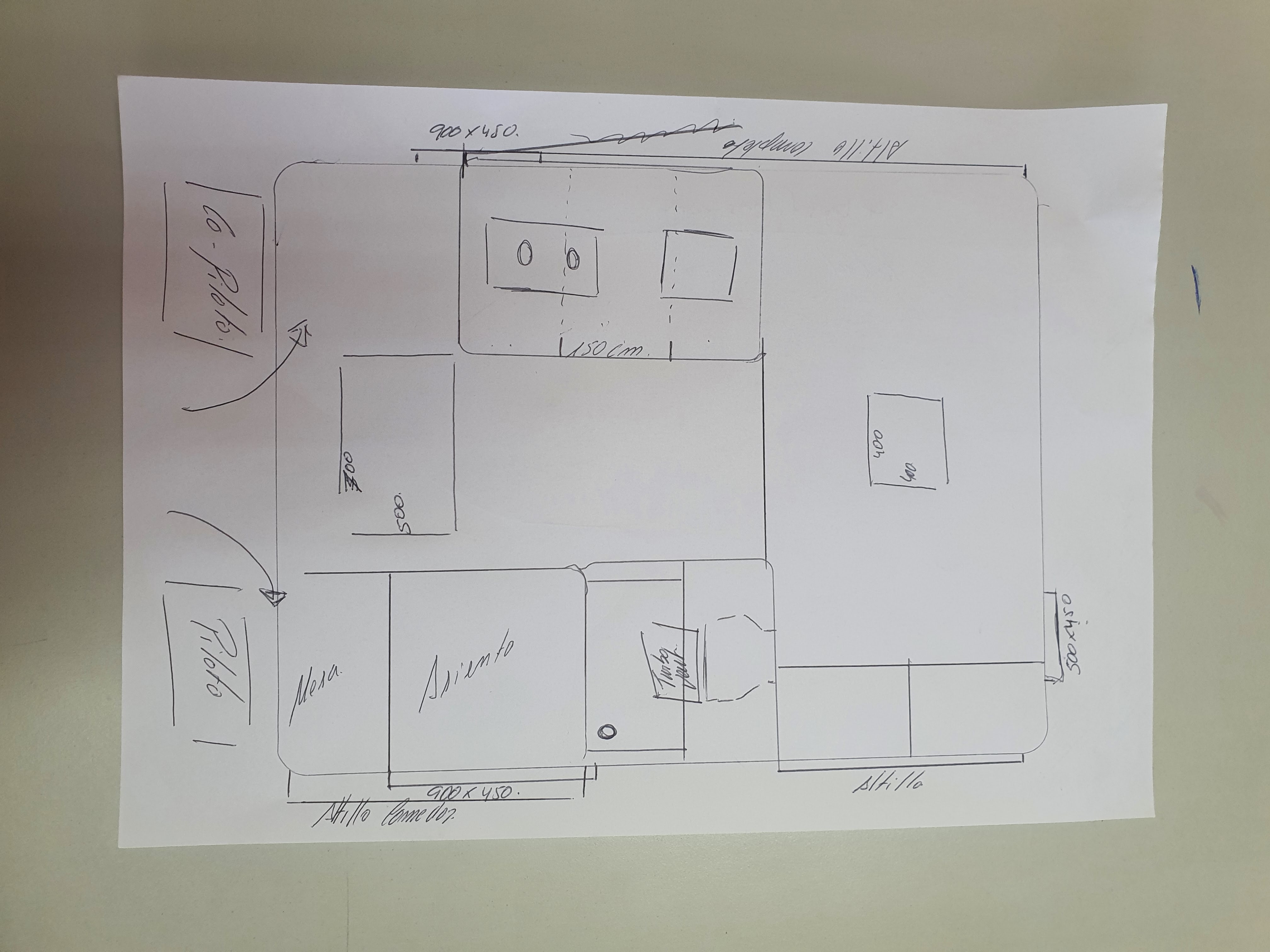
The interior van design will reflect all the decisions that you made so far. It’s a key point so you better take some time and do your research. I went through countless Youtube videos and Instagram posts. You can see one of my early pen and paper sketches in the photo above. I discussed this also with PortCamper who gave me valuable input in terms of measurements and create a 3D model for better visualisation.
Some important things you should consider:
Do you want a fixed or a fold-able bed? Should it be oriented lengthways or across? Fold-able beds give you more living space but are annoying to prepare each time.
Do you want a shower? Should it be inside of the van, outside, or both? Do you want hot water? If so, you need to think about which water system and where to place it.
Which toilet system do you want (if any) and where should it be located?
How do you want to cook? If you want an indoor, fixed cooking place, where should that be and what system do you want to use (gas, electric etc)? If gas, where should the cartridge be placed?
Do you need a heating? If so, what locations do you plan to travel to and how cold can it get there? Depending on this you may have to choose differently effective heating solutions.
Do you need a fridge? What size? Should it be energy efficient and silent? A silent fridge BTW is a gold tip.
Electrical System
When building the electrical system of your van, you better know what you are doing. If the system fails it can be extremely inconvenient or even dangerous. You either do a lot of research or outsource this to an expert.
The electrical system can be very simple or very complex depending on your requirements. It can be as simple as just using your car battery and connect just very few consumers to it, which not recommended. It is better and safer to create a separate circuit with a second battery. These batteries come in many different capacities, shapes, sizes, and types. Typical types are “Lead Acid”, “Lithium-Ion”, and “Lithium-Iron Phosphate”. The battery is at the core of the second circuit. You need to choose your compromise wisely regarding quality and price. I am using a Lithium-Ion battery, which is more expensive but also more reliable and durable. Since I live in the van full-time this is critical.
To charge the battery you can hook it up to the car engine (or the car battery), install an external power outlet, or the gold standard: install solar panels. Charging your battery with solar energy is a complex topic (different capacities, technologies, vendors, setups etc.) but will make you fully autonomous. If you can, I highly recommend to built that into your system.
A further decision you need to make is if you use a 12V or a 220V system or both. Again both will give you the highest degree of freedom but is more complex and more expensive.
Everything in van life is about knowing what you want to use the van for and then choose your compromises accordingly.
Water and Heating System
The water and heating system is another critical but complex system that is better done by an expert. Similar as with the electrical system your water circuit can be very simple (lowest autonomy) to very complex (best autonomy).
As a minimum, I recommend to have a fresh water tank. In my experience, this tank should be as large as you can possibly fit it. The tank of my van is 110L. Obviously, the larger it is the longer you can live off-grid.
A really good water system is one where you build the pipes into the walls and floor to serve cold and hot water (powered by a water pump) for different purposes like sink, shower, and toilet. The rest of the water (excluding toilet) should be collected in a grey water tank. Greg Virgoe describes an excellent water setup in his video. See also the schema below. My setup is very similar and it works perfectly.
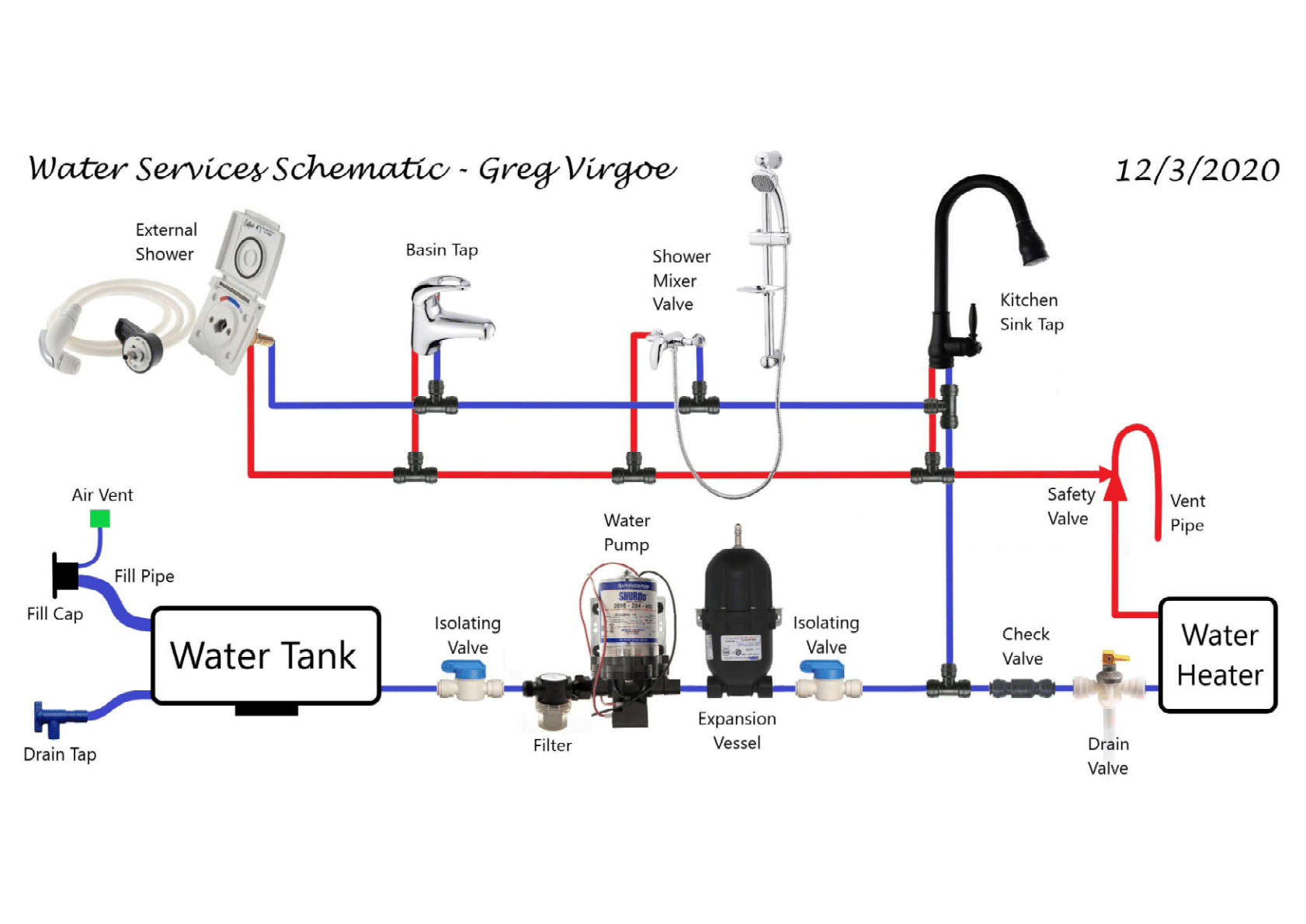
The heating for me is closely related to water. You don’t necessarily need an extra heating system depending on your van usage scenarios, for example, if you only use it for vacation in hot locations.
If you do install a heating system, it will make sense to also use it heat up water. Also here, there are many possibilities to do it. For me the best heating system is one that is powered by connecting to the Diesel tank of your car. It’s very energy efficient and super easy to use. It’s an extra module that heats the air in the van and has a little boiler integrated to produce hot water.
Practical Golden Tips
In this section I am presenting a random list of practical tips that based on my experience I found extremely useful.
Get a fully comprehensive insurance. This will give you peace of mind. Surprisingly they are not that expensive. Try and find an insurance company that offers specific camper van insurance. They understand the unique requirements (incl. International travel). These are better and cheaper than a standard car insurance offer.
Think where you can conveniently park your van while not using it. This may be a bit tricky if you live in a city with limited or height restricted underground parking. Also, you may get a parking that offers van features like access to electricity, water or toilet waste disposal.
Install a backup camera. This is priceless especially if you have a bigger van. Otherwise you are just blind while reversing.
A lot of people laughed, but my portable washing machine was a game changer. At some point you will have to do the laundry and driving into town to find a laundromat can be cumbersome with traffic, parking, etc.
I added a drink water filter to my kitchen tap to make the water from my fresh water tank drinkable. I am using the very economic and ecological product from the Barcelona startup TAPP.
A couple of smaller things that can “save your life” are to have the basic tools in your van (pliers, screwdrivers, knife, axe, tape etc). A headlight is valuable. I have an extendable 2m ladder. I love my hammock.
Introducing All My Pride: My Mercedes Sprinter Camper Van
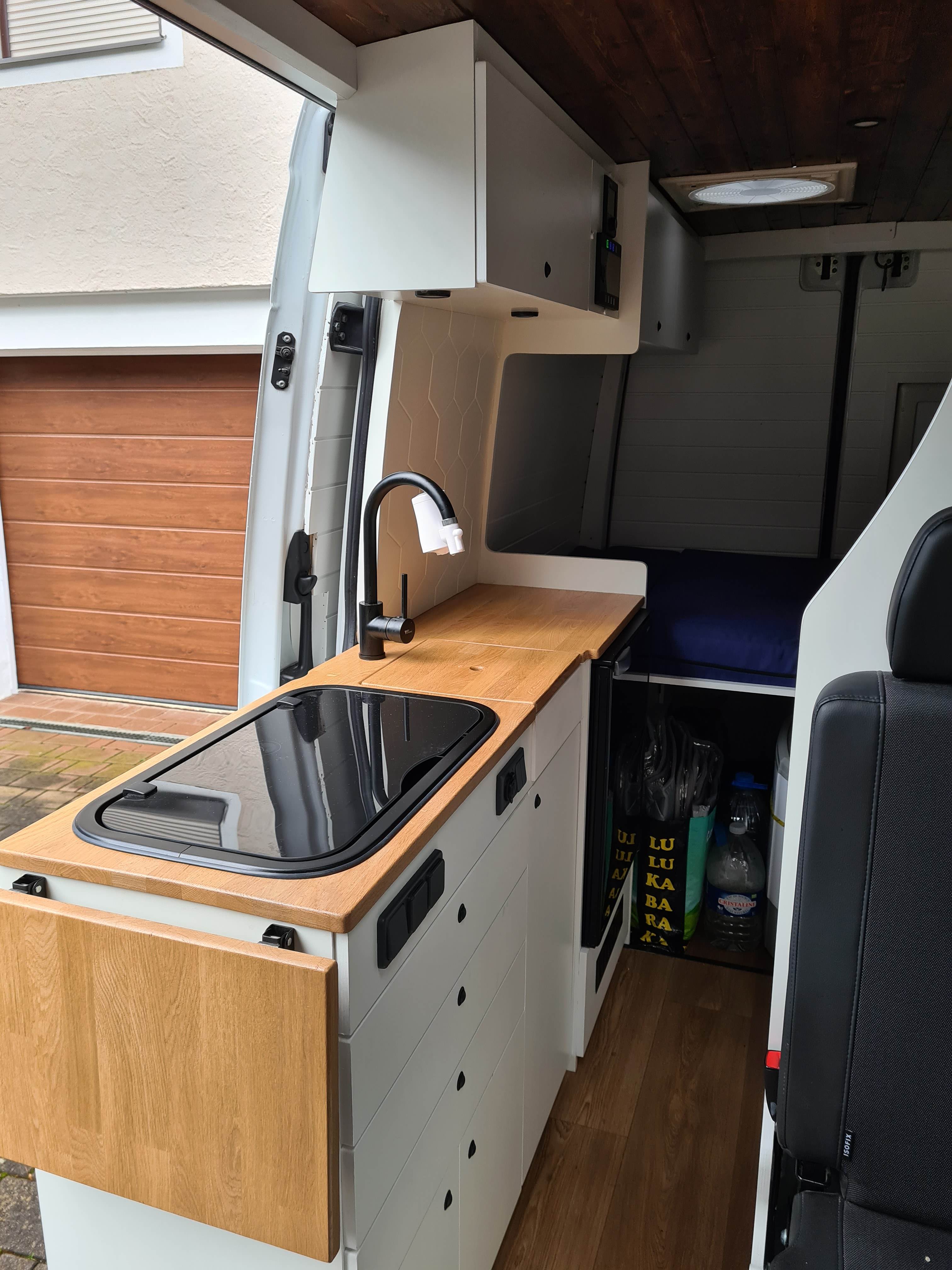
I am indeed very proud of my creation. The project execution originally was planned with a duration of 3 months. But then the pandemic came and everything was delayed. In the end it took us 13 months. Although this was a bit annoying, the positive side was that I had more time to think and design and implement new ideas.
Build Specifics
Going into all details of my specific camper van build would be a long blog post in itself. Instead, I recorded a video showing some of the highlights.
In terms of design principles, my van was build for full-time van life, which I am doing on and off. I usually travel in the van for several weeks up to some months. For that I need to be fully autonomous, which my van provides. Below are the key features summarised:
Mercedes Sprinter 314CDI (2016), L2H2
Heating and hot water boiler via Truma Combi 6D CP Plus connected to my Diesel tank
Double-layer insulation of walls, ceiling and floor via Kaiflex
Certified bench with seat belts in the back to transport 4 people in total. Sleeps 2
Complete electrical installation with second 100 Ah lithium battery, 1200W inverter, 330W Victron Energy solar panel, and 220V external outlet
Central control dashboard Centralita CBE PC 180
Belfast-style kitchen sink made of Solid Surface
Thetford Topline gas stove
VITRIFRIGO C75L fridge
Wet cabin for toilet and shower, made with Epoxy Marino and TarimaDeck, incl. water-saving shower head. Additional external, cold-water shower
Toilet WC Cassete Thetford
12V LED illumination throughout (incl reading lights)
All side and roof windows from Dometic and Fiamma (incl. fan)
These are the highlights. Here are some more videos on Instagram. If you want more details, feel free to reach out to me.
How Does This Van Fit Into My Freedom Strategy?
Building and living in a van supports my personal philosophy of maximising happiness in various regards. In a nutshell, happiness for me is the combination of health and freedom. The camper van lifestyle perfectly contributes to the freedom aspect. Freedom means many things in this combination. You can read the details in my article How To Live a Happy Life.
In essence, my camper van obviously gives me freedom in the sense of location independence. With some smaller restrictions I can basically drive and stay wherever I want. I managed to design my life so that I can basically work from anywhere as long as I have a laptop and Internet connection. This is mega. Although this also has challenges, it is actually much better than I anticipated. I talked about more details in this podcast interview.
The camper van lifestyle also contributes to financial freedom. On the one hand, I can reduce my expenses significantly as I am not paying rent. It is fully in line with the minimalism idea. On the other hand, the van life ecosystem is booming and it’s full of opportunities to creating (semi-) passive income (check organic almond farming). I have several ideas cooking which I will share in a future article.
However, one venture is already launched:
Together with Marie and Toni, we launched PortCamper Germany. The idea of this venture is to bring the Mediterranean Van into the German market. We believe with our design and quality we can help many Germans realizing their freedom and van life dreams.
Now You Know Everything You Need to Know to Build Your Perfect Camper Van
This was a lot of info. My intention was to share with you everything you need to know to build your perfect camper van. I discussed details about important decisions like your intended use, van size, model, interior design, and electrical and water systems. I also proudly presented my own creation. I love my Sprinter camper van. If that interests you, check out my article about How to Convert a VW Transporter Into a Camper Van: A Step-By-Step Guide.
The camper van lifestyle is perfectly in line with my overarching purpose. It gives me a ton of freedom and several opportunities to generate (passive) income streams. This is supported by my philosophy. I broke that down into the 18 Rails to Help You Maximize Your Happiness guide.
